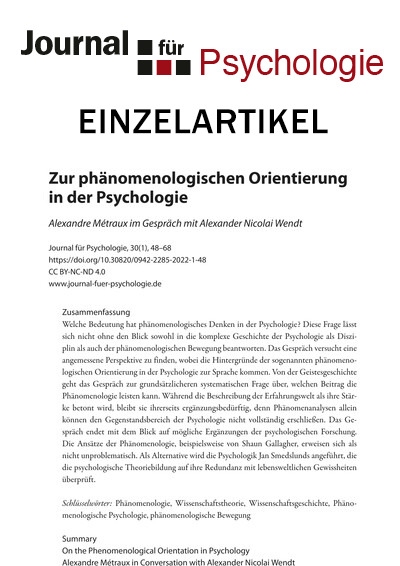On the Phenomenological Orientation in Psychology
Alexandre Métraux in Conversation with Alexander NicolaiWendt
DOI:
https://doi.org/10.30820/0942-2285-2022-1-48Keywords:
Phenomenology, theory of science, history of science, phenomenological psychology, phenomenological movementAbstract
What is the influence of phenomenological thinking in psychology? An answer to this question requires both considering the complex history of psychology as a discipline and the phenomenological movement. The dialogue tries to find an appropriate perspective, in which the background of the so-called phenomenological orientation in psychology is discussed. From intellectual history, the conversation moves to the more fundamental, systematic plain of the contribution phenomenology can make to psychology. It is emphasised that phenomenology provides an elaborated approach especially for the description of the world of experience. However, it needs to be supplemented because phenomenal analyses alone cannot fully meet the subject area of psychology. The conversation ends with a look at possible additions to psychological research. The approaches of phenomenology, for example, by Shaun Gallagher, prove to be not unproblematic. Jan Smedslund’s psycho-logic, which examines the redundancy of psychological theory formation with real-world certainties, is mentioned as an alternative.
Downloads
How to Cite
Métraux, Alexandre, and Alexander Nicolai Wendt. 2022. “On the Phenomenological Orientation in Psychology: Alexandre Métraux in Conversation With Alexander NicolaiWendt”. Journal für Psychologie 30 (1):48-68. https://doi.org/10.30820/0942-2285-2022-1-48.
Issue
Section
Artikel
License

This work is licensed under a Creative Commons Attribution-NonCommercial-NoDerivatives 4.0 International License.
This license allows private use and unmodified distribution, but prohibits editing and commercial use (further information can be found at: https://creativecommons.org/licenses/by-nc-nd/4.0/).
The terms of the Creative Commons licence only apply to the original material. The reuse of material from other sources (marked with a reference) such as charts, illustrations, photos and text extracts may require further permission for use from the respective copyrights holder.


